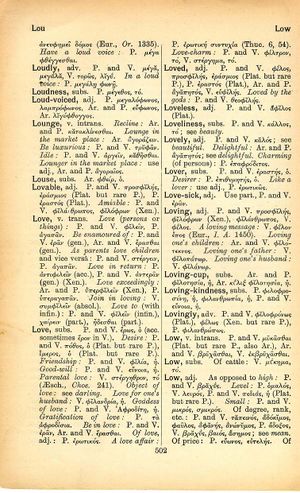low
ξένος ὢν ἀκολούθει τοῖς ἐπιχωρίοις νόμοις → as a foreigner, follow the laws of that country | when in Rome, do as the Romans do
English > Greek (Woodhouse)
verb intransitive
P. and V. μυκᾶσθαι (Plato but rare P., also Ar.), Ar. and V. βρυχᾶσθαι. V. ἐκβρυχᾶσθαι.
substantive
adjective
as opposed to high: P. and V. βραχύς.
level: P. ὁμαλός, V. λευρός. P. and V. πεδιάς, ἡ (Plato but rare P.).
small: P. and V. μικρός, σμικρός.
of degree, rank, etc.: P. and V. ταπεινός, ἀδόκιμος, φαῦλος, ἀφανής, ἀνώνυμος. P. ἄδοξος, V. βραχύς, βαιός, ἄσημος; see mean.
base, dishonourable: P. and V. αἰσχρός, κακός, πονηρός, φαῦλος, μοχθηρός, κακοῦργος, ἀνάξιος, Ar. and P. ἀγεννής.
vulgar, common: Ar. and P. φορτικός, ἀγοραῖος.
dejected (of spirits): P. and V. ἄθυμος (Xen.), V. δύσθυμος.
bring low, v.: P. and V. καθαιρεῖν, καταβάλλειν, συστέλλειν, κολούειν, P. ταπεινοῦν, Ar. and V. ἰσχναίνειν, V. κατισχναίνειν, κλίνειν, καταρρέπειν.
be brought low: also P. and V. κάμπτεσθαι (Plato).
have a low opinion of: see despise.
one word will lay you low: V. ἓν γὰρ ἐκτενεῖ σ' ἔπος (Eur., Medea 585).

